Hibernum Bromont
Hibernum Bromont, Quebec.
Hibernum Bromont, Quebec.
Harper is a master tactician. Knowing that there is a block of rightwing voters who have nowhere else to go, he has been willing to defy them in search of wider support: adopting liberal positions on abortion and gay marriage; veering leftwards to pump public money into the economy to avoid recession in 2008; reaching out to the migrants who now fill the suburbs of traditionally Liberal cities such as Toronto. He studies the stats. He makes the numbers add up. Harper has his roots in the same ideological soil as Thatcher and Reagan: cutting tax and rolling back the state; tough on crime and even tougher on the unions; boosting families and national pride; a solid economy that rewards those who work hard.
Harper has his roots in the same ideological soil as Thatcher and Reagan: cutting tax and rolling back the state
And then there were the tactics that were to attract such notoriety. They reflected the man's character - clever and harsh - moves that turned a democratic election into a mere sequence of manoeuvres. He learned from the master, Arthur Finkelstein, who had played the electoral game for Richard Nixon and Ronald Reagan. One of Harper's early allies from the 1990s, Gerry Nicholls, captured in his memoirs the special cynicism of Finkelstein's will to manipulate the electorate in his dictum: "We have to convince Canadians to drink pig's piss."
-- Nick Davies
Any Canadian who finds a long-form census on their doorstep in 2016 but fails to complete it could be hit with a fine of as much as $500 and a jail term of up to three months. The law requiring those penalties for non-compliance was never changed - it simply did not apply to the 2011 national household survey.
But Mr. Bains and Mr. Duclos either did not know, or did not want to discuss, what consequences would befall those who do not co-operate.
Reporters asked the ministers seven times to say whether there would be penalties for non-compliance and, each time, the ministers responded by discussing the importance of persuading Canadians to take part - or the fact that most people take it upon themselves to complete the forms. "If you speak to Canadians and you get them engaged in the process, they will fill out the information, and that's what we are focusing on because we need good, reliable data," Mr. Bains said.
Ather Akbari, an economics professor at St. Mary's University in Halifax, relies on census data dating back to 1981 for his studies of immigrants in the labour market. He said restoring the mandatory questionnaire "will help to set up evidence-based policy." And in his own work, he added, "it will help me draw meaningful comparisons from the past."
Alain Bélanger, Statscan's former assistant director, said the findings of the voluntary household survey distributed in 2011 were clearly skewed. If the government had opted for a voluntary survey again in 2016, he said, the results would have been even worse because bad data would have built upon bad data.
Small spot drawing big crowds for smoked meat sandwiches & other
Montreal-style Jewish deli staples
Mile End was opened by a married couple, Noah Bernamoff (a Canadian) and Rae Cohen (a New Yorker), in Boerum Hill in early 2010, in a cramped former garage retrofitted with vintage Woolworth's stools and pharmacy lamps. It soon had crowds clamoring for the Quebec innovation of smoked meat that falls somewhere between pastrami and corned beef.
53 Bond St, New York, NY 10012
On many measures, the Toronto YYZ $456-million Union Pearson Express (UPX) is a success. It has excellent on-time performance, generates good customer feedback and offers a welcome antidote to traffic. The black spot is ridership, which is lagging well below expected levels.
The fares - set deliberately high enough to avoid crowding on the train, according to a senior figure in transit planning - appear to be doing that job too well.
The train was the brainchild of David Collenette, federal transportation minister from 1997 to 2003. His original concept was for the private sector to build and run the service for a profit, with no subsidy from taxpayers. For this to be possible, however, the train would need a steep fare.
In late 2003, two years after issuing a request for proposals, Transport Canada chose a subsidiary of SNC-Lavalin to finance, build and operate the line. The train was to start running by the end of last decade and cost $20 each way.
But the project was more difficult than SNC expected. For one, some residents along the route, particularly in Weston, objected to having local streets shut down at level crossings and demanded changes, such as tunnels and more stops.
For another, SNC couldn't find the financing it needed.
"Its lenders did not feel that they had sufficient protection from 'no market' risk (that is, from a situation where, despite all reasonable efforts to attract riders, the service does not generate enough revenues to be a viable business)," Ontario's Auditor-General wrote in a 2012 report. "The group proposed that the province assume the lenders' risk by purchasing [air-rail link] assets if the 'no market' scenario arose. The province rejected this proposal, so the group walked away from the project."
Demand for the 65,000 H-1Bs available annually so outstrips supply that, last year, the window to file for them opened on April 1st ... and slammed shut only five days, and 172,500 applications, later.
So how were the lucky winners selected? By the quality of the employers? By the quality of the individuals? Of course not. By lottery. I kid you not.
Maybe this would be reasonable if all H-1B jobs were roughly equivalent. The problem is, as I've written before, they're anything but. Let's compare, say, Facebook and Google with those well-known body shops Tata Consultancy Services and Cognizant Technology Solutions. Click on the links in the previous sentence to see their H-1B stats for last year. See anything that jumps out at you?
That's right. Facebook and Google brought in 900 and 2,800 H-1B employees, respectively, with salaries of $140,000 and $127,000. Cognizant? 3,300 at $72,000. Tata? A whopping 16,435 for a (relatively) paltry $70,000 - literally less than half what Facebook paid.
LAANE's Jon Zerolnick spoke with Tom Slee, an Ontario-based writer whose work on the intersection of technology, politics, and economics has appeared in The Literary Review of Canada, The New Inquiry, The Guardian, and Jacobin.
One other thing that bothers me is a rhetoric the companies all use around the idea of "extra money." As in, "it's not a job, it's just a bit of extra money." Once you say "extra money," it's like, "Oh, we don't need rules and regulations, because it's just extra money." This is the same rhetoric that was used back in the 60s around women's jobs. There wasn't equal pay for equal work, because "it's not a real job, it's just extra money." Using the phrase "extra money" is a slippery way to undermine employment standards, and to undermine things that unions and progressive politicians have fought for for a long time. Any low-paying job is a way to earn "extra money." There's no such thing as "extra money."
Continue reading "Tom Slee: sharing is OK if not profitable." »
Toronto is the city of Rob Ford now, an expanding hot mess, fueled by dark secrets, inarticulate desires and inchoate fury. Overcoming nearly 200 years of sensible decisions and ingrained humility, Toronto is starting to get interesting. It has become a city making a spectacle of itself.
-- Stephen Marche is a novelist and a contributing editor for Esquire.
Molly still feels like a more respectable substance than others.
"I think people are much more aware of where coke comes from and what it does in those countries," said Sarah Nicole Prickett, 27, a writer for Vice and The New Inquiry, a culture and commentary site, who called cocaine a "blood drug." "Molly, if it's pure, it feels good and fun." (Much of it comes from Canada and the Netherlands, Mr. Payne said.)
Ms. Prickett, who moved to New York from Toronto last year, added that she could see why the drug might be taking hold in her new habitat.
"My impression of New York was that everyone just did drugs for work, that everyone was on speed," she said. "Molly makes you feel unplanned, and that's not a common feeling in New York, where everyone knows where they're going all the time and they're going very, very fast."
Rick Doblin, the founder of the Multidisciplinary Association for Psychedelic Studies, which has helped finance MDMA studies since the drug first entered the club scene, put Molly in the context of past drug trends: in the 1960s, he suggested, people searched for deeper spirituality and found LSD; in the '70s, as hippie culture became mainstream, marijuana entered the suburban household; in the '80s, cocaine complemented the extravagance and selfishness of the greed decade; and by the early '90s, youths dropped out of reality, dancing all night on Ecstasy or slumping in the corner on heroin. MDMA, which in addition to acting as a stimulant also promotes feelings of bonding and human connection, just might be what people are looking for right now.
"As we move more and more electronic, people are extremely hungry for the opposite: human interaction on a deeper level where you're not rushing around," Mr. Doblin said. "The rise of Molly is in tune with how people are feeling emotionally."
While some critics faulted Mr. Rakoff's writing as overly aphoristic, many praised his singular style, which combined an amiable dyspepsia with an almost palpable undercurrent of melancholy.
According to the RAND report, a quick, pre-emptive attack on an emerging fire could save $3.3 million, on average. Thus, it said, spending more on firefighting planes could save money over all.
Edward G. Keating, an economist who was the study's lead author, said some government agencies leased the scooper planes for $1.5 million to $2.5 million per season; depending on estimates of the destructiveness of fires and the effectiveness of air tankers, it might save money to use up to 55 of them, the study said.
But the Forest Service, which relies on older tanker planes that must land at an airport and be refilled by pumper trucks and which uses only a handful of scoopers, said the RAND study was wrong. The skimmer planes mostly drop water or foam, when often what is needed is fire retardant, said Thomas L. Tidwell, the chief of the Forest Service. And, he said, "they're underestimating the cost of scoopers and overestimating the cost of tankers."
Congress is considering a plan submitted by the Forest Service this year to buy C-130J air tankers, a variant of the Pentagon's cargo plane, but those could cost $85 million to $90 million each once refitted to carry fire retardant, government officials say.
The new study and the Forest Service's response highlight fundamental disagreements about how to fight fires. The study, for example, noted a "dearth of statistical evidence" about the effectiveness of using air tanker drops on already large fires. It used a term sometimes used by firefighters, who refer to "CNN drops," high-visibility efforts that give the impression of a strong government response.
The study also acknowledged uncertainties about the relative value of water, which is cheap and widely available, and retardant. Some of the water will blow off target or evaporate on the way down, and it will not last long on the ground, so dumping it in the path of a fire may not be effective. (Aircraft do not usually put out fires; they slow them down so workers on the ground can extinguish them or establish a firebreak around them.)
"Often when we're having these large fires, the relative humidity is in the single digits," Mr. Tidwell said, and what reaches the ground may be "just a real light sprinkling."
The retardant, which is denser and does not evaporate, can penetrate the canopy of leaves if the fire is in a wooded area, experts say, and can be dropped from a higher altitude, reducing risks.
Mr. Keating, the study's lead author, said such operations would be dangerous even with newer equipment. "There are extremely irregular wind currents because of the heat coming off the fire," he said. "You're at high elevation and low altitude in irregular terrain," close to the ground in mountainous areas, "and, oh, by the way, it's on fire." In some crashes, pilots may have become lost in the smoke.
But the RAND study argues that more frequent drops of water may be more effective. A scooper plane, which flies about 100 miles an hour over a river or lake and lowers a small scoop to skim off hundreds of gallons in a few seconds, can manage 60 loads a day if the water is convenient. That may be 10 times the capability of a plane dropping retardant. Two-thirds of the fires fought by the Forest Service are within 10 miles of a suitable body of water, the study said, and fires near towns are even more likely to be near water.
Another goal is to spot emerging fires that can be stopped by dropping water or retardant and focus on those, a challenge that the study called "dispatch prescience." Some firefighting assets, including helicopters, move so slowly that positioning them in places where they are most likely to be needed is an important step.
Firefighting strategy has other complications. Some environmental experts worry that scooper planes, or helicopters that lower buckets to collect water, could spread exotic mussels that contaminate rivers or lakes. And in some places, planes dump saltwater on the soil.
The Forest Service contracts for a variety of aircraft, mostly converted antisubmarine warplanes from the middle of the last century. At times it has used the Bombardier 415, a Canadian plane designed to fight fires. The plane can land on water, but refills its tanks, totaling 1,600 gallons, by skimming water off the surface in a fast pass.
A California company, International Emergency Services, has been trying to market a Russian plane that holds 3,000 gallons. This year, the company flew two Forest Service engineers to Russia to evaluate the plane, the BE-200. David Baskett, the president of International Emergency Services, offered to bring the plane to the United States for a "flyoff," but, he said, the Forest Service has not responded.
The United Church is not alone. All the secular liberal churches are collapsing. The Episcopalians - the American equivalent of the United Church of Canada - have lost a quarter of their membership in the past decade. They're at their lowest point since the 1930s. Not coincidentally, they spent their recent general meeting affirming the right of the transgendered to become priests. Not that there's anything wrong with that. But it doesn't top most people's lists of pressing spiritual or even social issues.
Back in the 1960s, the liberal churches bet their future on becoming more open, more inclusive, more egalitarian and more progressive. They figured that was the way to reach out to a new generation of worshippers. It was a colossal flop.
"I've spent all my ministry in declining congregations," says David Ewart, a recently retired United Church minister who lives in British Columbia. He is deeply discouraged about the future of his faith. "In my experience, when you put your primary focus on the world, there is a lessening of the importance of worship and turning to God."
The United Church's high-water mark was 1965, when membership reached nearly 1.1 million. Since then it has shrunk nearly 60 per cent. Congregations have shrunk too - but not the church's infrastructure or the money needed to maintain it. Today, the church has too many buildings and too few people to pay for their upkeep. Yet its leadership seems remarkably unperturbed. "It's considered wrong to be concerned about the numbers - too crass, materialistic and business-oriented," says Mr. Ewart. The church's leaders are like the last of the Marxist-Leninists: still convinced they're right despite the fact that the rest of the world has moved on.
Clearly, changes in society have had an enormous impact on church attendance. Volunteerism and other civic institutions are also in decline. Busy two-career families have less discretionary time for everything, including church. Sundays are for chores and shopping now. As for Sunday school, parents would rather take the kids to sports.
The Editor:
Am I the only person who complains about the southbound border wait times for NEXUS holders? I cross the border several times a week. Seldom is the wait more than a few minutes returning to B.C. when using the NEXUS lane. Typically, when I drive up to the booth after swiping my card the Canadian agent looks at me, looks at the screen and says go ahead or have a nice day and actually smiles.
Going south is a crapshoot. If you happen to be traveling south at the wrong time, you may end up waiting up to 30 minutes in the NEXUS lane. On a long weekend, don't be surprised to be waiting up to 90 minutes!
Why do NEXUS holders have to put up with such long waits going south compared to going north? NEXUS card holders have had a background check, been fingerprinted, photographed, interviewed and issued what apparently is supposed to be a secure ID card that can't be forged yet some U.S. border guards continue to ask 20 questions instead of relying on random checks with zero tolerance. Where are you going? Purpose of your trip? Why are you going there? How often do you come down? Are you meeting anyone there? Are they Canadian or U.S.? Are they friends? When are you returning? Anything to declare? (Good question, the only one that should be asked.)
Some U.S. border guards seem to grasp the trusted traveler concept and when they man the booth, things move along reasonably. Unfortunately, there is no consistency among them which leads me to the conclusion that there is a lack of proper training specifically related to the Nexus lane.
This has been an ongoing problem since the NEXUS program was introduced. I am sure that U.S. business owners would be happy to see more business in these difficult economic times.
Unless the border guards change their ways, you are going to see less business as people get fed up with the ridiculous waits and cancel their golf memberships, move their yachts to Canadian waters and return to shopping in Canada.
Name withheld by request
White Rock
Finance Minister Jim Flaherty of Canada had proclaimed that "there does not appear to be a bubble in the country's housing market and that the level of consumer defaults has not increased in any significant way."
via whispersfromtheedgeoftherainforest, Canada Bubble, and Mish.
What will happen to the typical mortgage when rates adjust up ?
Worthwhile Canadian Initiative is a humble mostly macro-policy blog, by Stephen Gordon, Mike Moffatt, Nick Rowe and Frances Woolley has left leaning macro economic views from Canada.
Examples: Should recent immigrants be eligible for Old Age Security looks at guaranteed an income above the poverty line by Old Age Security, Guaranteed Income Supplement and the Canada Pension Plan.
My sister, Rachel Goddyn, believes that expanding female job opportunities have led to a decline in the quality of elementary and high school teachers.
he cure can be worse than the disease. At the most recent Canadian Economics Association meetings, University of Toronto PhD student Hugh Macartney presented a paper looking at a US program designed to create incentives for good teaching. Students were tested at the end of each year, and schools were rewarded if test scores showed improvement over time. What's the way to game that system? Teach students poorly in the first year and well in the last year - and Macartney found evidence that this was exactly what was happening.
Is it Canada Day yet ?
Sean Avery is a jerk, a locker room cancer, and he loves attention. In short, I expect to see him suiting up for Toronto.
-- John Fischer of In Lou We Trust.
In the past, Igor Kenk has said that he was accumulating bicycles in preparation for a severe oil shortage. But in a somewhat disjointed interview in July for a radio documentary, portions of which were published by The Globe and Mail, a Toronto daily newspaper, Mr. Kenk portrayed himself as a crusader against theft and a protector of cast-off bicycles.
Mr. Kenk holds a passport from Slovenia and has claimed he was a police officer and a former K.G.B. agent. He has shed little light since his arrest. After one court session, he told reporters, "I'm a dead man."

Continue reading "Foreign oil speculator outrages Toronto cyclists" »
2008 STANLEY CUP FINALS (Best-of-7)
1. Detroit vs. Pittsburgh, 8 p.m. Saturday, May 24
2. Pittsburgh at Detroit, 8 p.m. Monday, May 26
3. Pittsburgh at Detroit, 8 p.m. Wednesday, May 28
4. Detroit at Pittsburgh, 8 p.m. Saturday, May 31
5. Detroit at Pittsburgh, 8 p.m. Monday, June 2
6. Pittsburgh at Detroit, 8 p.m., if necessary Wednesday, June 4
7. Detroit at Pittsburgh, 8 p.m., if necessary Saturday, June 7
Great live news at NHL.com.
Previously: 2007 Stanley Cup playoffs.
Then in 2004, during a discussion about whether visors should be
mandatory for N.H.L. players — Don Cherry believes they lead to
more reckless stickwork — he said disparagingly,
“Most of the guys that wear them are Europeans and French guys.”
Cherry came under criticism for that remark but was vindicated
somewhat by the fact that most visors in the N.H.L. were
indeed worn by European and French Canadian players.
Hocky Night in Canada, reported by by Matt Higgins.
We moved to Canada, by former Americans.
MeFi says the CBC mothercorp finally kills off its treasure, Brave New Waves.
See also radiofreecanuckistan, insidethecbc, cleverlazy, zoilus, Discorder, Canada.com, StilePost.
Examples:
Why we lie.
*
tribute to Montreal.
Solomon: Stephen Harper won an election because he had five
points. They were simple. They were easy to understand. If
Stéphane Dion had five points and I was taking an elevator
ride with you what are the five points I should know about
the Dion platform? Sum them up.
Dion: I have only three pillars.
Solomon: You only have three, that’s even shorter, Stéphane.
Dion: Three pillars with me: we’ll have a much more strong
economy, more social justice, and a safe environment.
Solomon: Those are the three pillars.
Dion: Yeah.
Solomon: But are there three, you know….
Dion: Oh, you want concrete deliverables.
Solomon: Yeah, those are five deliverables. remember he said
he’d cut the GST. He had five deliverables. what’s your five
deliverables?
Dion: And they are very bad policies and people see that today.
Solomon: Do you have five better ones?
Dion: So, I will not copy Harper. He is copying Bush. I will not
copy him. I will be myself.
Solomon: But, do you need deliverables?
Dion: Yes. I will have deliverables. You will you open your
door, I’m doing door to door. You ask me why I would vote
Liberal?
Solomon: Yeah.
Dion: I will ask you: are you thinking to retrofit your house,
to change your house, to buy a cottage, to buy a new car,
to change your appliances or your furnace or your
acclimatization? Very likely you will say yes to something.
Then I say, 'perfect, I will give you a very good labelling.
You will know which product will save you money over
the years because it will be energy efficient and your
electricity bill will go down. But this product is likely to
be more costly at the beginning. So I will help you to
offset the cost with a tax rebate. Vote for me!'
Vision:
Science, research and education powerhouse
Fans and endorsers:
Rob Edger
Westmount Liberal
Calgary Grit
idealisticpragmatist
The Tyee - Laura
Accepted by:
Fuddle Duddle (formerly fuddle-duddle)
dynamiteonline (but Dion needs to learn to speak English)
Detractors:
Bob Rae-supporting RedTory says 'Dion was, um, clumsy at best and his English, quite atrocious and haphazard'.
Canada looks more like a police state than a democracy
eight days after the kidnapping of British Trade
Commissioner James Cross. On Parliament Hill a
reporter confronts Prime Minister Pierre Elliott Trudeau:
"What is it with all these men and guns around here?"
By calling in army tanks and men in full gear, Trudeau
boosted national security. But the military's presence
makes some Canadians feel a whole lot less secure.
How far will the prime minister extend law and order?
Just watch him. (1970, October)
MINI Arctic Expedition 2007 planning.
Previously
Tilley Endurables, supplier of safari style tourist fashion.
Classic hats, cargo pants, and sturdy belts.
The writing profession has a yo-yo-diet effect on diet.
"Everybody loses weight on hiatus, and everybody gains
weight during the show. You break up the long day by
getting a little ritualistic snack. It's like cigarette breaks
used to be."
"Someone at 'Friends' would get a thing of Gummi Bears
and line them up by color before eating them."
-- Greg Malins, who wrote for "Friends" and "Will and Grace"
and is now a writer and executive producer for "How I Met
Your Mother".
"Our room is obsessed with Tim's jalapeño chips and
these salt-and-vinegar chips that Greg has flown
in from Canada.
No kidding. Their salt-and-vinegar-ness is, like,
illegal in the States."
-- Gloria Calderon Kellett, one of Malins's colleagues.
THE CANADIAN'S CREED AND PLEDGE
I believe in Canada.
I love her as my home. I honour her institutions. I rejoice
in the abundance of her resources.
I glory in the record of her achievements. I have unbounded
confidence in the ability of her people to excel in whatsoever
they undertake. I cherish exalted ideals of her destiny as a
leader among world nations.
To her I pledge my loyalty. To the promotion of her best interests
I pledge my support. To her products I pledge my patronage.
And to the cause of her producers I pledge my devotion.
[SDA]
Stylish Coloradoan VodkaPundit's serious thinking or linking.
Bonus points for recommending I’m An Adult Now by
The Pursuit of Happiness.
--
If you like TPOH, you'd like Jerry Jerry & Sons Of Rhythm Orchestra's
Battle Hymn of the Apartment.
Hockey playoff season.
Toronto's alternative-rock scene is a place where the sweetly
familial and weirdly collective rub up against the traditional
markers of stardom. BSS is the largest and the most media-ready
of the Toronto bands, but it is far from the only band committed
to a Toronto-bred arty idealism, known to some as Torontopia.
Jonny Dovercourt, a 32-year-old local rock musician and impresario,
and his friend Steven Kado, a musician with an interest in hipsterish
pursuits like urban planning, coined the term in 2002 to help give
utopian ballast to the city's sprawling but idealistic music community.
Dovercourt is so committed to Toronto that he adopted one of its
street names, Dovercourt, as his last name; his real name is Jonathan
Bunce.
Generation X at 40 attracts civil thoughtful comments.
How Canadian.
Highlights: Friday chat.
Down with pervasive remote-sensing automated computerized
biometric surveillance - Up With Hats !
calgarygrit is not lost in wilderness.
But is outnumbered
bluegrit epitomizes level headed Liberals. Example:
western civilization. There were many leftists during the Cold War
who empathized with the Soviet Union. In the same vein, today,
there are many who try to make excuses for the Islamists.
-- 2006 Feb.
For the moment, to put it nicely, the same thing has happened to the
Liberals in Canada, as has happened to other long-serving single-party
regimes elsewhere in the world. Technology has caught up with their
ability to manage information; and a sheltered population is losing
its fear. The more the ruling party tries to scare them, with
heavy-handed old-media campaigns, the worse things get --
for the ruling party.
Continue reading "Liberal one party Canada 0 vs Blogosphere 1" »
Mapping the 2006 arctic expedition.
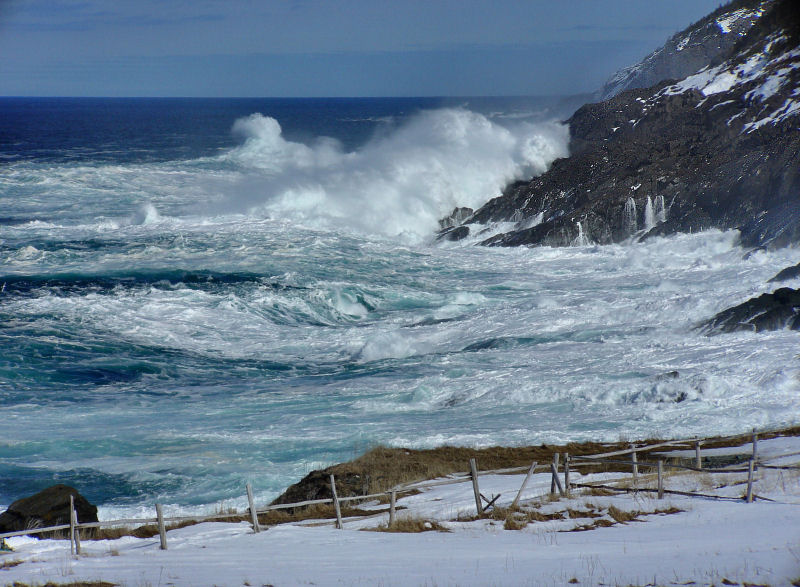
Planning threads:
MINI2
NE MINI
Arctic MINI reference by Ross Trusler.
Itinerary
More about Newfoundland:
Picture gallery by Jerry Curtis.
Weather:
Saint John's: BureauMétéo
Increasing cloudiness. Snow at times mixed with ice pellets beginning overnight.
Snow and ice pellet amount 5 to 10 cm. Wind becoming east 20 km/h then increasing
to 40 gusting to 60 overnight. Temperature rising to zero by morning.
A must for high volume social networkers and consumers and producers
of information, and self-promoters. 2006 Feb 10-11, Vancouver.
Friday will be a little more unorthodox for regular conference goers.
In the spirit of Foo Camp and Bar Camp, Northern Voice includes a
whole self-organized day dedicated to Moose Camp.
ex-Hip, ex Active Perl guy Dick Hartd now chases marrying privacy
and convenience in a single sign on.
And he appreciates fine cars, travel, and wine.
An excellent presentation at O'Reilly's Open Source 2005.
Sinosplice: worthy of blogrolling: updates
Ape Rifle / China-on-the-Thames / ode to VW Santana (Dasher/Quantum/Passat ?) /
Montreal over Toronto / subtle subtitles
Vancouver police and the RCMP are not rushing to enforce B.C.'s new
law outlawing aggressive panhandling and squeegeeing, saying it will
take them some time to figure out exactly how they're going to use
it.
"Will there likely be any tickets issued today? Probably not,"
Vancouver police spokesman Const. Howard Chow said Friday. "And it's
not because we don't like the act -- but it's growing pains with any
new legislation coming out. It was just released yesterday."
Chow said the department still needs time to get details about the
Safe Streets Act and its penalties out to its officers on the beat
and to resolve enforcement issues, such as how to issue tickets to
people without a fixed address.
Chad Skelton and Krisendra Bisetty
Vancouver Sun
2005 January 29
Continue reading "Police unsure how to enforce squeegee kids law" »
The Liberals will form the next government after this month's
provincial election (2005 May 17) in British Columbia. Exactly who
will be sitting in the House isn't certain yet in at least two
ridings after initial counts ended in razor-thin margins.
Roundup:
Right: Fraser Institute
The Liberals have almost nothing to gain by placating the demands of
union leaders. They may further recognize that introducing flexible
and balanced labour laws would result in a better functioning labour
market for B.C. workers, one characterized by higher rates of job
creation, lower unemployment, and higher wages. Finally, they may also
realize that, by introducing measures of flexibility into the
province’s labour laws, they will indirectly weaken the powers
afforded union leaders.
Contrary to the posturing of many union leaders, B.C. still maintains
relatively rigid and biased labour laws. A recent evaluation of
provincial and state labour relations laws found that B.C. ranked 57th
out of the 60 jurisdictions in terms of flexibility and balance.
Left:
Even bear604 is no fan of Jenny Kwan
Uptick's arctic trek gallery.
Ross Trusler's Arctic MINI and Dave Rose' DuctTape.
Peter E (nakedpillowfight) 's gallery.
Sonia Arrison's infrequent Canadians in the US updates.
NE (New England / North East) MINI thread on Hudson trip.
Vancouver housing market.
Somewhere between curbed and housing bubble.
Noticed and awarded.
James Bay road's wide shoulders offer progressively deeper
snow the further off road you go. The centre of the road
offers a thin layer of packed snow and ice.

2005 February 18 to 22
February 2005
Su Mo Tu We Th Fr Sa
-- -- _1 _2 _3 _4 _5
_6 _7 _8 _9 10 11 12
13 14 15 16 17 18 19
20 21 22 23 24 25 26
27 28
Fri Feb 18: NYC -- Montreal -- Val D'Or +
Sat Feb 19: Radisson
Sun Feb 20: Radisson
Mon Feb 21: Montreal
Here's the basics of what I would consider a good plan:
FRIDAY
Leave Montreal area by 12 Noon
Arrive Matagami by 10 PM Friday night.
Have beer.
Sleep.
SATURDAY
Depart Matagami by 9 AM
Arrive James Bay / Hudson by 7 PM Saturday night.
Have beer.
Sleep.
SUNDAY
Leaving that in the hands of a "meeting" planner, I'm just doing transportation.
MONDAY
Depart by 9 AM
Arrive Matagami by 7 PM Monday night
Have beer.
Sleep.
TUESDAY
Depart by 7 AM
Haul all the way home.
END.
More touristy listings
bonjourquebec
anglais
Nord-du-Québec
Excellent James Bay Road Highway #109 travel page and kilometre posts.
0 begin
37 Matagami
257 Rupert River and Rapids
381 24hr gas 'Road Halt'
617 Radisson
Road conditions in western Quebec and on the James Bay Highway 109
by Transports Quebec.
"For the most recent information, communicate without expenses
with the
Company of energy of the Bay James (SEBJ) with the
1-888-676-INFO (4636) or
with the Municipality of Bay-James (MBJ) with
(819) 739-4473."

Mont-Laurier – Grand-Remous
Grand-Remous – Limite de la réserve faunique
Limite de la réserve faunique – Milieu de la réserve faunique
Milieu de la réserve faunique – Louvicourt
Louvicourt – Val-d'Or

Champlain, New York (US/Canada border) to:
Val-d’Or: 365.5 Miles, Estimated 7 hours, 18 minutes
Amos: 407.7 Miles, Estimated 8 hours, 9 minutes
Matagami: 508.7 Miles, Estimated 10 hours,15 minutes
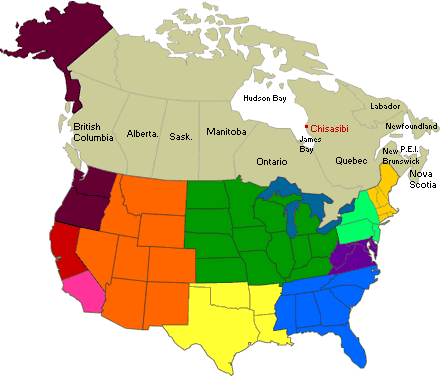

STL, MO --------- NYC, NY: 1021 miles 15 hours 42 mins
NYC, NY --- Radisson, Que: 1264 miles 19 hours 26 mins
(NYC, NY -- Bennington, VT: 192 miles 3 hours, 42 mins
Radisson is 650% farther north than Vermont)
====
Champlain, New York (US/Canada border) to:
Val-d’Or: 365.5 Miles, Estimated 7 hours, 18 minutes
Amos: 407.7 Miles, Estimated 8 hours, 9 minutes
Matagami: 508.7 Miles, Estimated 10 hours,15 minutes
Bear in mind that from Milford NH to Champlain NY is 235 miles,
Estimated 4 hours 21 minutes, while the first day may be more for
others. We will stop along the way and I'd bet no less than a half
hour will be spent at the meeting place in NY/Canada.
The Next Day to Radisson according to AAA:
Matagami: 372 miles, Estimated 8 hours 24 minutes
Amos: 485 miles, Estimated 11 hours 1 minute
Val d'Or: 538 miles, Estimated 12 hours 13 minutes
The ideal is Val d'Or, as we know, but Amos is about as far north
as we should go on Day 1.
See also MINI2 thread, New England MINI thread and Ducttape Dave Rose's master site.
*** What to bring ***
1. Clothing: [US Elite gear]
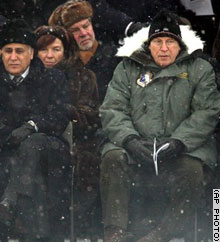
1.2 gloves
1.3 socks
1.4 pants:
F-1B Extreme Cold Weather Trousers
F1B Flight Pants from Army Navy Sales.
or Military ECWCS Hyvat Trousers at Army navy Deals
or fleece bear pants.
Correlation monger provides pair-wise correlation of
demographic variables across 50 US states. For example,
Canadians increase property values.
Listen live to CBC Radio One Vancouver.
More USA-Canada maps from the post-election era.
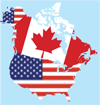 .
.
from Canada is an ally in the War on Terror.
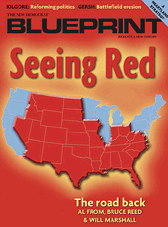
from BluePrint magazine.
The US amends the federal constitution every 8 to 11 years,
it it that time again ? Arnold & Jen in 2008 ?
Article 2, Section 1, Clause 5 of the United States Constitution:
"No Person except a natural born Citizen, or a Citizen of the United
States, at the time of the Adoption of this Constitution, shall be
eligible to the Office of President; neither shall any Person be
eligible to that Office who shall not have attained to the Age of
thirty five Years, and been fourteen Years a Resident within the
United States."
We think it's time for a change.
Arnold is California Gubernator Arnold Schwarzenegger.
Jen is Michigan Governor Jennifer Granholm.
Vancouver (Canada) news from the _Sun_.
Canada is an ally in the War on Terror.